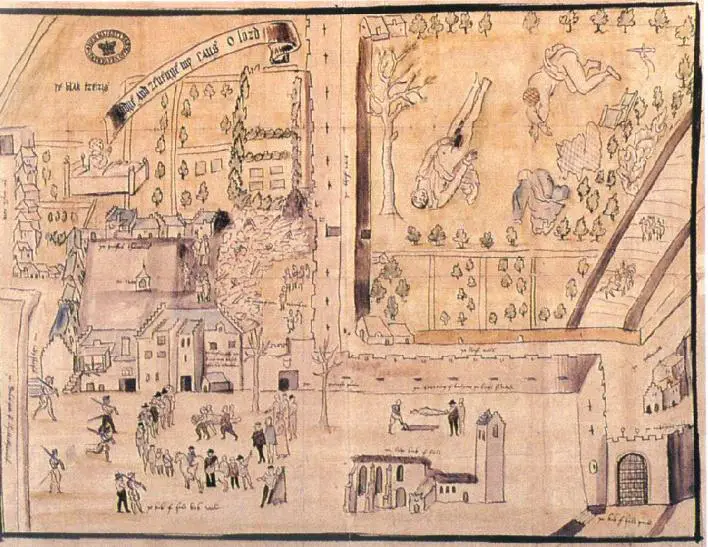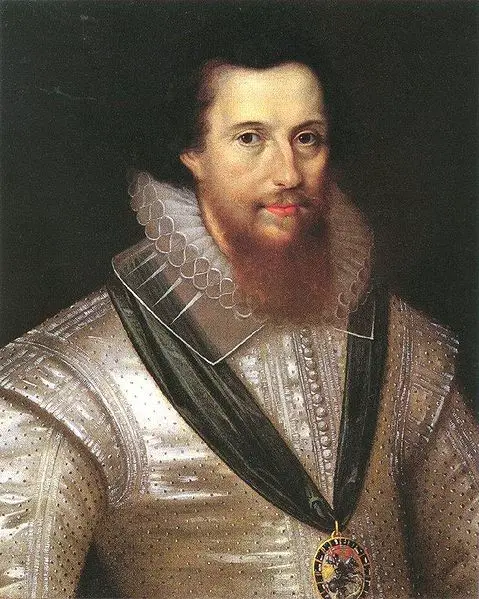John Hooper, Bishop of Gloucester and Worcester, was burned at the stake in Gloucester. He had been deprived of his bishopric in March 1554, due to his marriage. Rowland Taylor, Rector of Hadleigh in Suffolk, Canon of Rochester Cathedral, Archdeacon of Bury St Edmunds, Archdeacon of Cornwall and former chaplain to Thomas Cranmer, Archbishop of Canterbury, was burned on Aldham Common, near Hadleigh. Both men were executed as part of Queen Mary I's persecution of Protestants.
Martyrologist John Foxe records Bishop Hooper's execution, a burning which took a long time to kill the poor man:
"About eight o'clock, on February 9, 1555, he was led forth, and many thousand persons were collected, as it was market-day. All the way, being straitly charged not to speak, and beholding the people, who mourned bitterly for him, he would sometimes lift up his eyes towards heaven, and look very cheerfully upon such as he knew: and he was never known, during the time of his being among them, to look with so cheerful and ruddy a countenance as he did at that time. When he came to the place appointed where he should die, he smilingly beheld the stake and preparation made for him, which was near unto the great elm tree over against the college of priests, where he used to preach.
Now, after he had entered into prayer, a box was brought and laid before him upon a stool, with his pardon from the queen, if he would turn. At the sight whereof he cried, "If you love my soul, away with it!" The box being taken away, Lord Chandois said, "Seeing there is no remedy; despatch him quickly."
Command was now given that the fire should be kindled. But because there were not more green fa*ots than two horses could carry, it kindled not speedily, and was a pretty while also before it took the reeds upon the fa*ots. At length it burned about him, but the wind having full strength at that place, and being a lowering cold morning, it blew the flame from him, so that he was in a manner little more than touched by the fire.
Within a space after, a few dry fa*ots were brought, and a new fire kindled with fa*ots, (for there were no more reeds) and those burned at the nether parts, but had small power above, because of the wind, saving that it burnt his hair and scorched his skin a little. In the time of which fire, even as at the first flame, he prayed, saying mildly, and not very loud, but as one without pain, "O Jesus, Son of David, have mercy upon me, and receive my soul!" After the second fire was spent, he wiped both his eyes with his hands, and beholding the people, he said with an indifferent, loud voice, "For God's love, good people, let me have more fire!" and all this while his nether parts did burn; but the fa*ots were so few that the flame only singed his upper parts.The third fire was kindled within a while after, which was more extreme than the other two. In this fire he prayed with a loud voice, "Lord Jesus, have mercy upon me! Lord Jesus receive my spirit!" And these were the last words he was heard to utter. But when he was black in the mouth, and his tongue so swollen that he could not speak, yet his lips went until they were shrunk to the gums: and he knocked his breast with his hands until one of his arms fell off, and then knocked still with the other, while the fat, water, and blood dropped out at his fingers' ends, until by renewing the fire, his strength was gone, and his hand clave fast in knocking to the iron upon his breast. Then immediately bowing forwards, he yielded up his spirit.
Thus was he three quarters of an hour or more in the fire.
Even as a lamb, patiently he abode the extremity thereof, neither moving forwards, backwards, nor to any side; but he died as quietly as a child in his bed. And he now reigneth, I doubt not, as a blessed martyr in the joys of heaven, prepared for the faithful in Christ before the foundations of the world; for whose constancy all Christians are bound to praise God."
Foxe also records Rowland Taylor's burning:
"All the way Dr. Taylor was joyful and merry, as one that ccounted himself going to a most pleasant banquet or bridal. He spake many notable things to the sheriff and yeomen of the guard that conducted him, and often moved them to weep, through his much earnest calling upon them to repent, and to amend their evil and wicked living. Oftentimes also he caused them to wonder and rejoice, to see him so constant and steadfast, void of all fear, joyful in heart, and glad to die.
When Dr. Taylor had arrived at Aldham Common, the place where he should suffer, seeing a great multitude of people, he asked, "What place is this, and what meaneth it that so much people are gathered hither?" It was answered, "It is Aldham Common, the place where you must suffer; and the people have come to look upon you." Then he said, "Thanked be God, I am even at home"; and he alighted from his horse and with both hands rent the hood from his head.
His head had been notched and clipped like as a man would clip a fool's; which cost the good bishop Bonner had bestowed upon him. But when the people saw his reverend and ancient face, with a long white beard, they burst out with weeping tears, and cried, saying: "God save thee, good Dr. Taylor! Jesus Christ strengthen thee, and help thee! the Holy Ghost comfort thee!" with such other like good wishes.
When he had prayed, he went to the stake and kissed it, and set himself into a pitch barrel, which they had put for him to stand in, and stood with his back upright against the stake, with his hands folded together, and his eyes towards heaven, and continually prayed.
They then bound him with the chains, and having set up the fa*ots, one Warwick cruelly cast a fa*ot at him, which struck him on his head, and cut his face, sot hat the blood ran down. Then said Dr. Taylor, "O friend, I have harm enough; what needed that?"
Sir John Shelton standing by, as Dr. Taylor was speaking, and saying the Psalm Miserere in English, struck him on the lips:"You knave," he said, "speak Latin: I will make thee." At last they kindled the fire; and Dr. Taylor holding up both his hands, calling upon God, and said, "Merciful Father of heaven! for Jesus Christ, my Savior's sake, receive my soul into Thy hands!" So he stood still without either crying or moving, with his hands folded together, until Soyce, with a halberd struck him on the head until his brains fell out, and the corpse fell down into the fire.
Thus rendered up this man of God his blessed soul into the hands of his merciful Father, and to his most dear Savior Jesus Christ, whom he most entirely loved, faithfully and earnestly preached, obediently followed in living, and constantly glorified in death."
You can read more about these men, their lives, what they were accused of and their examinations in Chapter 16 of Foxe's Book of Martyrs - click here.






Leave a Reply